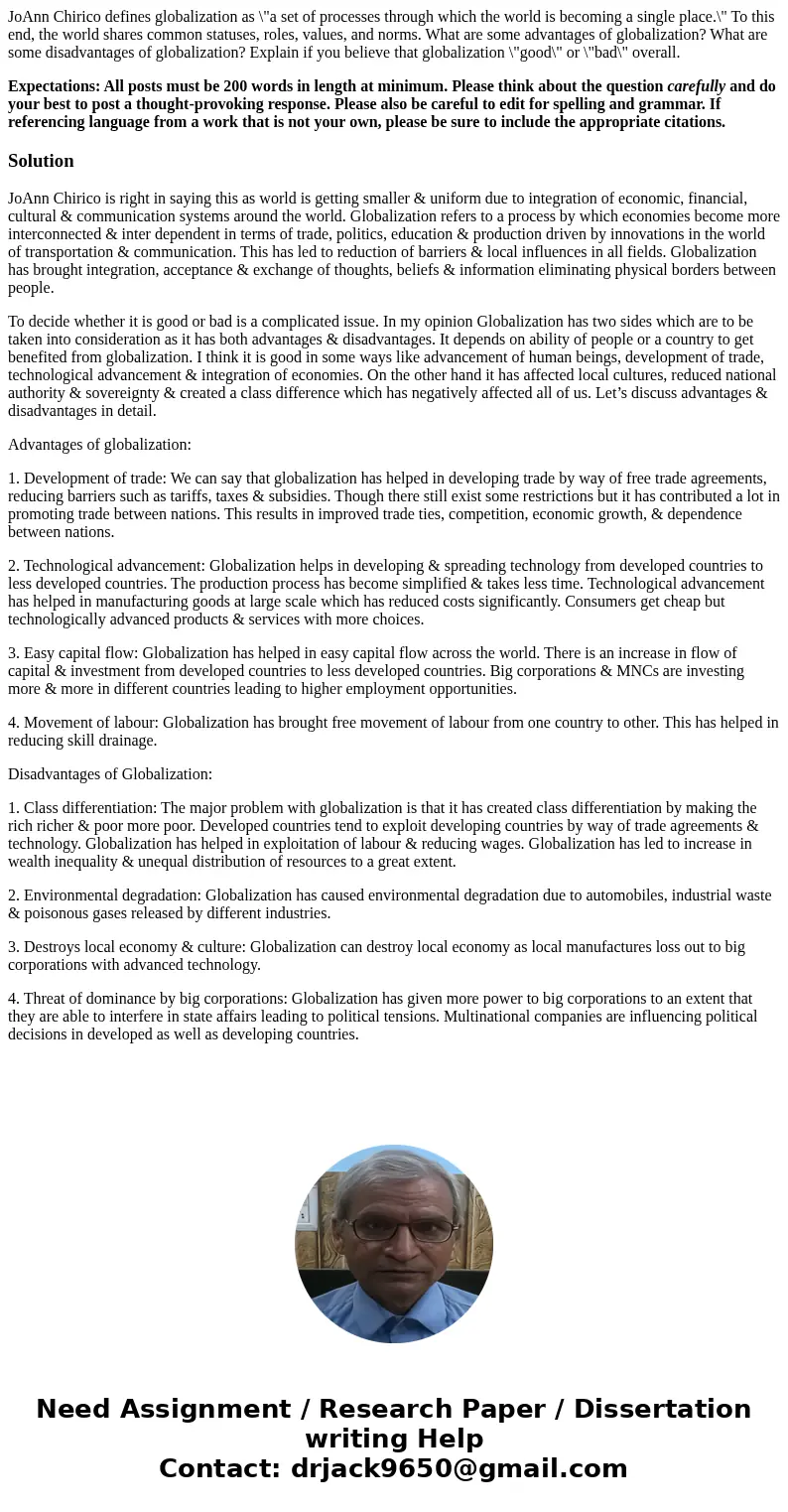JoAnn Chirico defines globalization as a set of processes th
JoAnn Chirico defines globalization as \"a set of processes through which the world is becoming a single place.\" To this end, the world shares common statuses, roles, values, and norms. What are some advantages of globalization? What are some disadvantages of globalization? Explain if you believe that globalization \"good\" or \"bad\" overall.
Expectations: All posts must be 200 words in length at minimum. Please think about the question carefully and do your best to post a thought-provoking response. Please also be careful to edit for spelling and grammar. If referencing language from a work that is not your own, please be sure to include the appropriate citations.
Solution
JoAnn Chirico is right in saying this as world is getting smaller & uniform due to integration of economic, financial, cultural & communication systems around the world. Globalization refers to a process by which economies become more interconnected & inter dependent in terms of trade, politics, education & production driven by innovations in the world of transportation & communication. This has led to reduction of barriers & local influences in all fields. Globalization has brought integration, acceptance & exchange of thoughts, beliefs & information eliminating physical borders between people.
To decide whether it is good or bad is a complicated issue. In my opinion Globalization has two sides which are to be taken into consideration as it has both advantages & disadvantages. It depends on ability of people or a country to get benefited from globalization. I think it is good in some ways like advancement of human beings, development of trade, technological advancement & integration of economies. On the other hand it has affected local cultures, reduced national authority & sovereignty & created a class difference which has negatively affected all of us. Let’s discuss advantages & disadvantages in detail.
Advantages of globalization:
1. Development of trade: We can say that globalization has helped in developing trade by way of free trade agreements, reducing barriers such as tariffs, taxes & subsidies. Though there still exist some restrictions but it has contributed a lot in promoting trade between nations. This results in improved trade ties, competition, economic growth, & dependence between nations.
2. Technological advancement: Globalization helps in developing & spreading technology from developed countries to less developed countries. The production process has become simplified & takes less time. Technological advancement has helped in manufacturing goods at large scale which has reduced costs significantly. Consumers get cheap but technologically advanced products & services with more choices.
3. Easy capital flow: Globalization has helped in easy capital flow across the world. There is an increase in flow of capital & investment from developed countries to less developed countries. Big corporations & MNCs are investing more & more in different countries leading to higher employment opportunities.
4. Movement of labour: Globalization has brought free movement of labour from one country to other. This has helped in reducing skill drainage.
Disadvantages of Globalization:
1. Class differentiation: The major problem with globalization is that it has created class differentiation by making the rich richer & poor more poor. Developed countries tend to exploit developing countries by way of trade agreements & technology. Globalization has helped in exploitation of labour & reducing wages. Globalization has led to increase in wealth inequality & unequal distribution of resources to a great extent.
2. Environmental degradation: Globalization has caused environmental degradation due to automobiles, industrial waste & poisonous gases released by different industries.
3. Destroys local economy & culture: Globalization can destroy local economy as local manufactures loss out to big corporations with advanced technology.
4. Threat of dominance by big corporations: Globalization has given more power to big corporations to an extent that they are able to interfere in state affairs leading to political tensions. Multinational companies are influencing political decisions in developed as well as developing countries.

 Homework Sourse
Homework Sourse